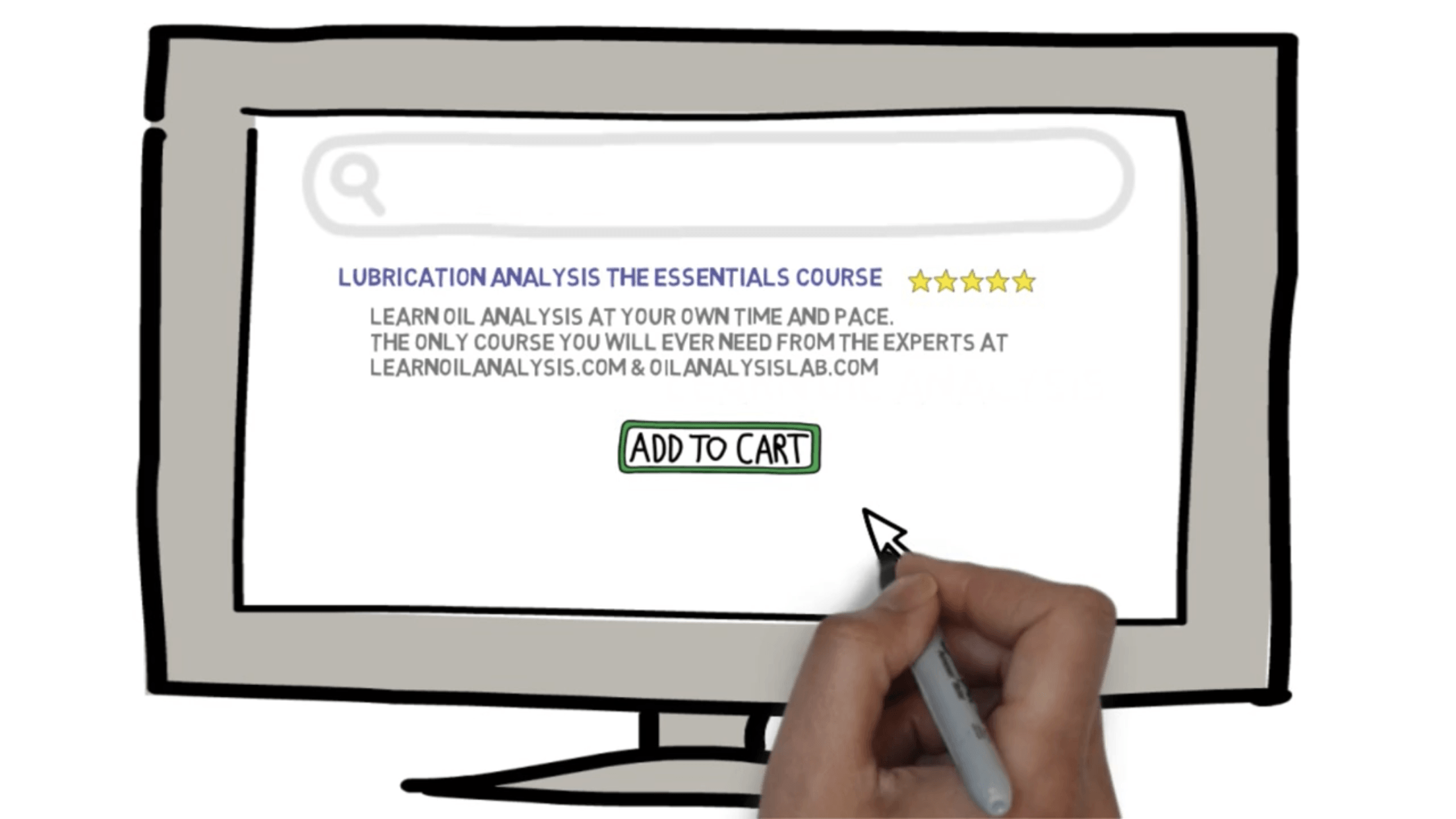If you are in somehow involved with lubrication then this course is for you. Covers everything from the basics to mastering the skills to perfect your oil analysis and lubrication management programme.
People who will find this course useful include:
If you are planning on taking an oil analysis course or exam, this can be an excellent prep course or revision course before the exam.
If you are already an established lubrication professional and just want a refresher course or want to topup your evidence for your continous professional development for recertification.
Or if you are a complete novice to oil analysis novice and want to learn more. This course takes you to master level whatever your background and keeps you up to date with the latest innovations in the industry too.
If there is one course you take this year, this is it.
| Types of maintenance and how they apply in various industries |
| Unit 1 |
Why do machines fail? |
|
| Unit 2 |
Why Oil Analysis? |
|
| Unit 3 |
History of oil analysis |
|
| Unit 4 |
Costs of Failure |
|
| Unit 5 |
Causes of failure investigation |
|
| Unit 6 |
Evolution from reactive to proactive and reliability centred |
|
| Unit 7 |
Condition Based Maintenance (CBM) |
|
| Unit 8 |
Bonus Reading Material LOA |
|
| Learn how oils are made, additive and, how lubricants work. |
| Unit 1 |
What is a lubricant & what is its function? |
|
| Unit 2 |
Lubrication theory - How lubricants lubricate. |
|
| Unit 3 |
Base oils |
|
| Unit 4 |
Lubricant Additives |
|
| Understanding how to select the lubricants for reliable and cost effective machinery |
| Unit 1 |
Lube selection - should I lubricate and what lubricant type? |
|
| Unit 2 |
Lubricant selection - Viscosity |
|
| Unit 3 |
ISO Viscosity Grades |
|
| Unit 4 |
SAE vs ISO Monogrades |
|
| Unit 5 |
Viscosity Multigrades (SAE) |
|
| Unit 6 |
Selecting the right grease |
|
| Unit 7 |
Understanding classification systems of oils |
|
| Unit 8 |
Further Lubricant Classification systems |
|
| Now you know which lubes, the next question is how to deliver them effectively. |
| Unit 1 |
Lubricant application |
|
| You have spent all that money on your lubricants, now what is the best way to store them to make the most of your lubes. |
| Unit 1 |
Lubricant Storage |
|
| Learn how to get longer lubricant life through contamination control and also how lubricants can be tested for contamination. |
| Unit 1 |
Effects of contamination & Abrasive wear |
|
| Unit 2 |
Silicon based contamination |
|
| Unit 3 |
Handling contamination in Lubricants and introduction to filtration methods. |
|
| Unit 4 |
Secret Life of Particles |
|
| Learn the fundamentals of the most important step in the sampling process and that is taking the oil sample. A poor sample leads to poor quality information being gained from the sample. |
| Unit 1 |
Oil Sampling |
|
| Unit 2 |
Oil Sampling Hardware |
|
| Unit 3 |
Electronic Sample Submission |
|
| A roundup of some of the most common lubricant tests including routine, specialist and new oil tests. |
| Unit 1 |
Viscosity |
|
| Unit 2 |
Wear Elemental Analysis, PQ, Ferrous Debris & LubeWear |
|
| Unit 3 |
Oxidation and thermal degradation of lubricants and the testing via Acid Number, Base Number, initial pH and Varnish Potential |
|
| Unit 4 |
Additional Tests to know about |
|
Explanation of different component types and their related issues related to them |
| Unit 1 |
3D Model usage - what the icons mean |
|
| Unit 2 |
Engines |
|
| This is the nitty gritty of what oil sampling is about. Learning how lubricants fail and how to diagnose faults. |
| Unit 1 |
How to read an Oil sample Report? Part 1 |
|
| Unit 2 |
How to read an Oil sample Report? Part 2 |
|
| Unit 3 |
How to read an Oil sample Report? Part 3 |
|
| Ferrography, the study of wear particles following a failure is one of the most interesting parts of oil analysis. Although only the very basics need to be known for a level 1 exam, we believe in going beyond this to give candidates a good grounding for further levels of study by explaining the principles early on. |
| Unit 1 |
Wear Types (fatigue, cutting, sliding etc) |
|
| This content is rarely covered in any great level 1 or 2 examinations, but since the objective of the course is to be able to build your own lube analysis programme with your partner lab the following module will help you post achieving your certifications and allow you to put fleet wide analysis into practice. Hence some of this content goes beyond the usual accrediting bodies requirements, but will be invaluable to you in the years to come as you wish to optimise your programme. |
| Unit 1 |
Developing a lubricant management and analysis programme |
|
| Unit 2 |
Building your case for oil analysis |
|
| Unit 3 |
Vibration, Thermography & Accoustic Emision |
|
| Unit 4 |
Revision & End of Course Assessment Part 1 of 2 |
|
| Unit 5 |
End of Course Assessment (Part 2 of 2) |
|
| Unit 6 |
Feedback |
|
| Unit 7 |
Further Practice Questions |
|




Jim Tocher (verified owner) –
I was intending to do one of the classroom versions of these courses with another lab, but taking a week out to take the course was an issue (especially with Covid lockdowns), so I thought I would try an online version. It was very reasonably priced compared to the classroom based prices my old lab was charging and I could do it at my own pace.
I got 84% at the end, which I was pleased with and I think I will go ahead and do a classroom course now too and try get my PCN certification.
Constructive feedback I would have liked a bit more visual elements to taking samples with a dipstick rather than just a written procedure. I spoke to the course tutor and he has since added a video specifically on this to the course which I thought was a nice personalised touch.
Aimilia Smith (verified owner) –
I don’t normally give high scores on reviews. The review scoring only allows 4 or 5, so I have given the benefit of the doubt and given the 5.
The course is a little challenging at first, but like some of the other reviewers have said you do get a lot out of it. I actually took a classroom course 3 years ago and this was a great refresher. I printed off the certificate to put in my record of continuous development.
My 1 niggle was you can’t skip sections and have to complete one before going to another. My preference would be to be able to read in any order and then take the exam, but the site does try guide you to go in the order it suggests. However at the end it did give a chance to revisit any section which I enjoyed going in the order I wanted. I guess the site chose to do it this way because you could technically go to the end and get the certificate without the training. If you don’t mind being given the order to learn in then the course is perfect.
Ryan Williams (verified owner) –
I booked this with lots of expectations, the first unit felt a little bit recapping stuff I already knew and this is the dryest part of the course, so I was keen to race through to the good stuff. I know that first section is there because it is required for the ISO syllabus and that’s why it’s been added in, but for me the real interesting part was the tests and more importantly how to diagnose an oil analysis report. The ferrography stuff was the best section and I felt I learnt a lot. I have even sent off my first filter for analysis that has been having regular bypass issues as a result.
I would say a tip to those doing it is to set aside some time to do each section, I did try to do the first section quickly and I found I had to refer back later on and do it again as I didn’t read it properly the first time.